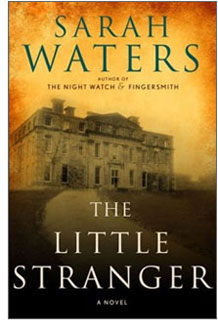 |
 Sarah Waters
Sarah Waters
The Little Stranger
Reviewed by: Rick Kleffel © 2009
Riverhead / Penguin Putnam
US First Edition Hardcover
ISBN 978-1-59448-880-1
463 Pages; $26.95
Publication Date: 04-30-2009
Date Reviewed: 05-10-09
Index:
General-Fiction
Horror
Fantasy
Every day, we add another room to the memory palaces that are our lives. We fashion these structures from the stories we tell ourselves, and pretend that we are objective observers of our own narratives. Of course, our objectivity is the first lie we tell ourselves. After that, it's easy.
When we first glimpse Hundreds Hall in Sarah Waters' 'The Little Stranger,' our narrator, Dr. Faraday, reaches back to his childhood and remembers it as, "blurred, and slightly uncertain — like an ice, I thought, just beginning to melt in the sun." Rest assured; in the pages that follow, both the doctor and the mansion will be come into focus. Of course, what we see so clearly may not be entirely real, but it will certainly seem real to the doctor. The first rule of lying to yourself is to believe your own lies, absolutely.
Faraday, whose mother once worked as a maid at Hundreds Hall, has hard-scrabbled his way to become a doctor in post World War II Britain, just as the Labour party tosses out Churchill and embarks on the path towards the National Health Service. Hundreds Hall remembered from his youth as the site of a grand fete hosted by the then-grand Ayres family, is now a crumbling wreck. The Ayres are no longer grand either; Roderick, the son, came back from the war physically and mentally wounded; the grand dame Ayres, now a widow, is reduced to serving the doctor tea; one daughter dies as a child and the surviving daughter in smart but "plain." The once burgeoning staff is reduced to a kindly housemarm and an easily agitated servant girl. This is a household that is clearly quite ill in many ways; one can hardly be surprised that the doctor decides to insert himself into their lives and try to cure things.
Faraday's plans don't work out as he expects, but "The Little Stranger" is a wonderfully layered success. Waters' prose is lucid and transparent, but loaded with details that are always important and always telling. She rewards the readers who take their time to immerse in this decaying, rotting social landscape. From the first paragraph onwards, she's giving you clues as to where the novel is going and why. For all the languor of the pace and descriptions, there's not a single wasted word here. The novel is shot through with a mordant sense of humor and snappy dialogue in the best tradition of British banter. As a historical piece, it is perfectly researched but there's a timeless quality to the isolated story she's telling. She easily extracts the eternal from the everyday.
Readers won’t soon forget any of the characters they met in "The Little Stranger." Faraday is an ever-tightening bundle of contradictions, a man of medicine who nonetheless is willing to give more than a little credence to ghostly explanations for the increasingly unsettling and threatening events that unfold. The Ayres clan are finely wrought Dorian Grays crumbling, crumbling with every page that passes and every word that is uttered. And of course, Hundreds Hall, the central character, is a rotting palace that will fill your mind with sagging walls and creaking hallways. The world of "The Little Stranger" is unrelentingly organic; the whole novel is a ruthless kudzu that creeps forth to overwhelm our sensibilities.
Waters' plotting and pacing are deliberate and detail-oriented; they mirror the house and its inhabitants, and may at times test readers' patience. That patience is richly rewarded as decay is transformed into outright destruction, as mirrors are cracked and revealed. "The Little Stranger" is a novel that rewards re-reading. Many will find themselves turning from the last page to the first. As Waters ushers out the back door of Hundreds Hall, we yearn to enter its rotting riches once again.
|
 |
